Unit5 Do you want to watch a game show?Section A 1a-3b 知识点串讲课件(共15张PPT)
文档属性
| 名称 | Unit5 Do you want to watch a game show?Section A 1a-3b 知识点串讲课件(共15张PPT) | 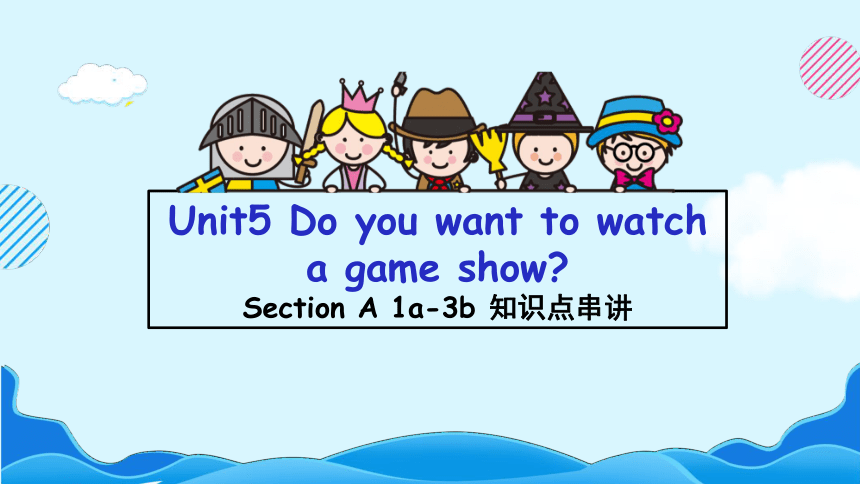 | |
| 格式 | zip | ||
| 文件大小 | 1.1MB | ||
| 资源类型 | 教案 | ||
| 版本资源 | 人教新目标(Go for it)版 | ||
| 科目 | 英语 | ||
| 更新时间 | 2022-10-10 15:29:35 | ||
图片预览

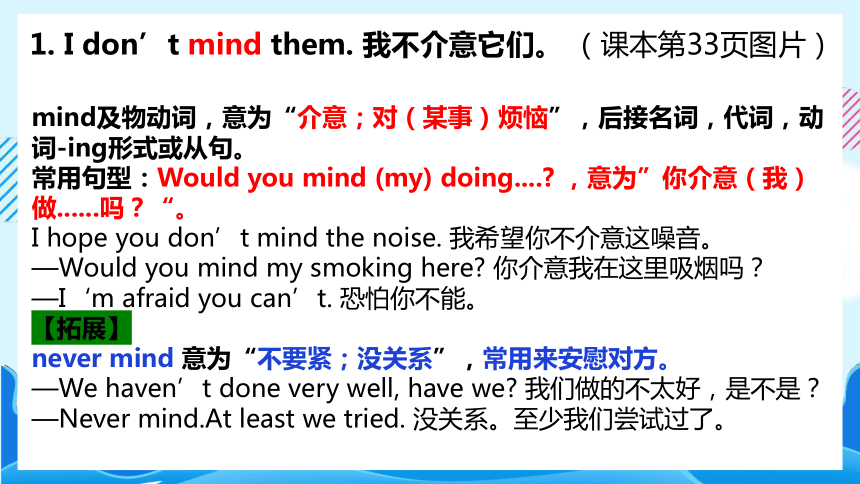
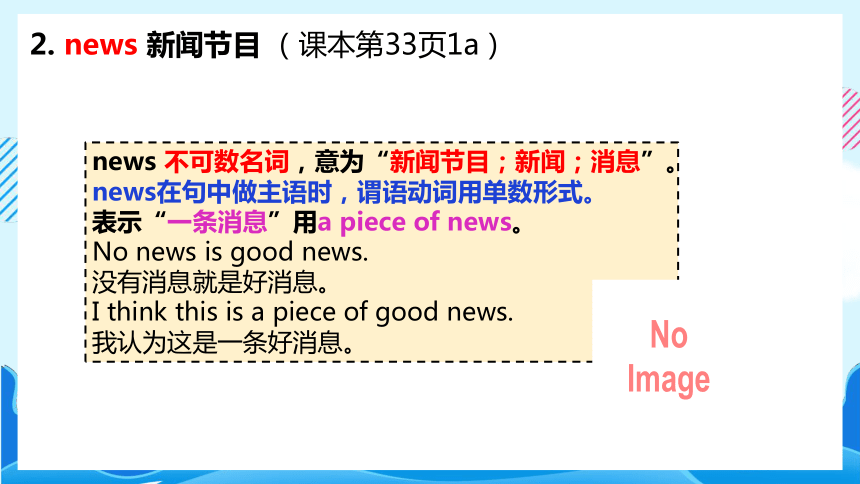
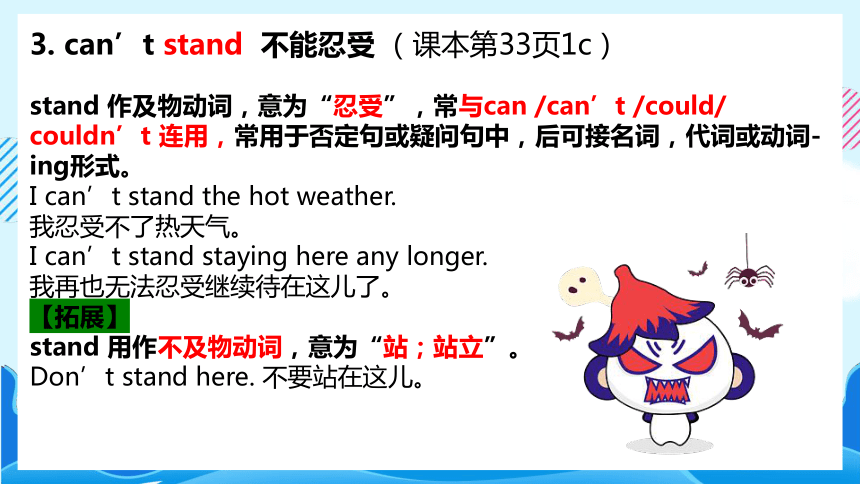
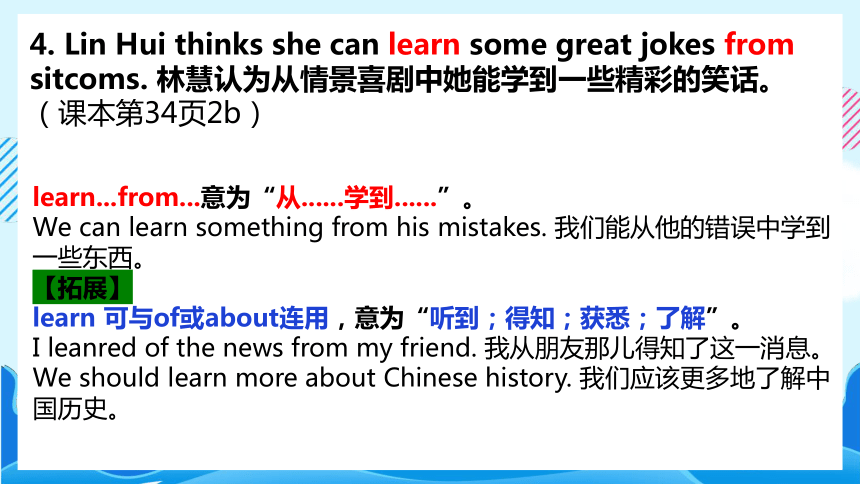
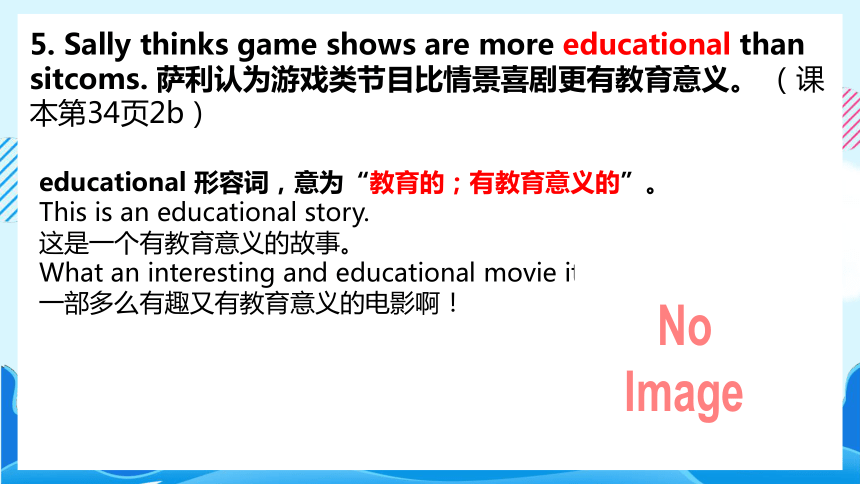
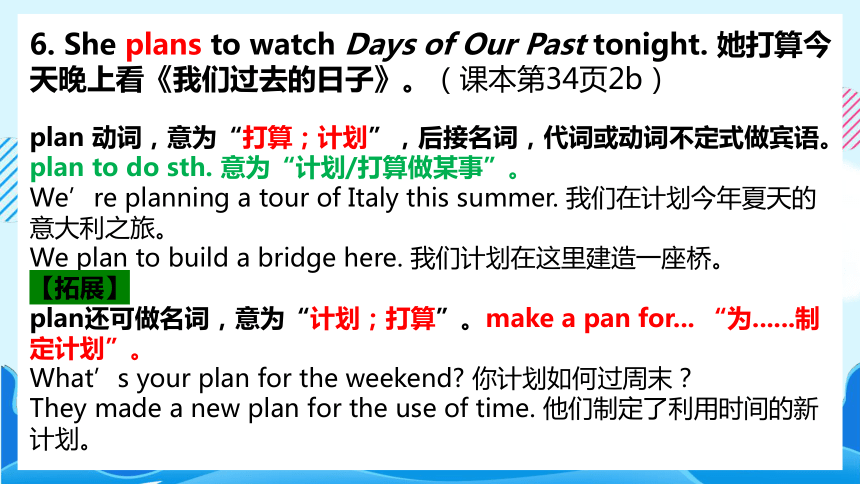
文档简介
(共15张PPT)
Unit5 Do you want to watch a game show
Section A 1a-3b 知识点串讲
1. I don’t mind them. 我不介意它们。 (课本第33页图片)
mind及物动词,意为“介意;对(某事)烦恼”,后接名词,代词,动词-ing形式或从句。
常用句型:Would you mind (my) doing.... ,意为”你介意(我)做......吗?“。
I hope you don’t mind the noise. 我希望你不介意这噪音。
—Would you mind my smoking here 你介意我在这里吸烟吗?
—I‘m afraid you can’t. 恐怕你不能。
【拓展】
never mind 意为“不要紧;没关系”,常用来安慰对方。
—We haven’t done very well, have we 我们做的不太好,是不是?
—Never mind.At least we tried. 没关系。至少我们尝试过了。
2. news 新闻节目 (课本第33页1a)
news 不可数名词,意为“新闻节目;新闻;消息”。
news在句中做主语时,谓语动词用单数形式。
表示“一条消息”用a piece of news。
No news is good news.
没有消息就是好消息。
I think this is a piece of good news.
我认为这是一条好消息。
3. can’t stand 不能忍受 (课本第33页1c)
stand 作及物动词,意为“忍受”,常与can /can’t /could/ couldn’t 连用,常用于否定句或疑问句中,后可接名词,代词或动词-ing形式。
I can’t stand the hot weather.
我忍受不了热天气。
I can’t stand staying here any longer.
我再也无法忍受继续待在这儿了。
【拓展】
stand 用作不及物动词,意为“站;站立”。
Don’t stand here. 不要站在这儿。
4. Lin Hui thinks she can learn some great jokes from sitcoms. 林慧认为从情景喜剧中她能学到一些精彩的笑话。(课本第34页2b)
learn...from...意为“从......学到......”。
We can learn something from his mistakes. 我们能从他的错误中学到一些东西。
【拓展】
learn 可与of或about连用,意为“听到;得知;获悉;了解”。
I leanred of the news from my friend. 我从朋友那儿得知了这一消息。
We should learn more about Chinese history. 我们应该更多地了解中国历史。
5. Sally thinks game shows are more educational than sitcoms. 萨利认为游戏类节目比情景喜剧更有教育意义。 (课本第34页2b)
educational 形容词,意为“教育的;有教育意义的”。
This is an educational story.
这是一个有教育意义的故事。
What an interesting and educational movie it is!
一部多么有趣又有教育意义的电影啊!
6. She plans to watch Days of Our Past tonight. 她打算今天晚上看《我们过去的日子》。(课本第34页2b)
plan 动词,意为“打算;计划”,后接名词,代词或动词不定式做宾语。
plan to do sth. 意为“计划/打算做某事”。
We’re planning a tour of Italy this summer. 我们在计划今年夏天的意大利之旅。
We plan to build a bridge here. 我们计划在这里建造一座桥。
【拓展】
plan还可做名词,意为“计划;打算”。make a pan for... “为......制定计划”。
What’s your plan for the weekend 你计划如何过周末?
They made a new plan for the use of time. 他们制定了利用时间的新计划。
7. Because I hope to find out what’s going on around the world. 因为我希望弄清世界上正在发生什么事。(课本第34页2c)
(1)hope 动词,意为“希望”,后面可接不定式或that从句,接that从句时that可省略。
We hope to see you again.=We hope(that) we can see you again. 我们希望能再次见到你。
【拓展】
hope后可接so或not,即I hope so.或I hope not.,用来做简略回答。
—Will you be back before dark 你天黑之前能回来吗?
—I hope so. 但愿吧。
【辨析】 hope 与 wish
Jim hopes to win the match. 吉姆希望赢得比赛。
I wish (that) I were a bird. 我希望我是一只鸟。
(2)find out 意为“查明;弄清”。
At last the police found out who murdered the old woman. 最后警方查明了是谁谋杀了那位老太太。
【辨析】 find out 与 find
hope wish
hope to do sth. wish to do sth.
hope+that从句(能实现的愿望) wish+that从句(不易实现的愿望)
hope不跟不定式作宾语补足语 wish sb. to do sth.
find out “查明;弄清”,指经过调查,询问,研究后搞清楚,弄明白,后常跟宾语从句。
find “找到;发现”,通常强调寻找的结果。
8. We had a discussion about TV shows. 我们就电视节目进行了讨论。(课本第34页2d)
discussion名词,意为“讨论;商量”。
have a discussion about...意为“进行(一次)关于......的讨论”。
He joined us in the discussion yesterday.
他昨天参加了我们的讨论。
We had a discussion about the house.
我们就房子的事情进行了讨论。
9. I like to follow the story and see what happens next. 我喜欢跟随故事看接下来会发生什么。 (课本第34页2d)
happen 不及物动词,意为“发生;出现”。常用结构:sth. happen(s) to sb. 某人遭遇了某事。
The story happened in 1876. 故事发生在1876年。
A bad accident happened to him. 他出了严重的事故。
【辨析】 happen 与 take place
I hope nothing has happened to them. 我希望他们没出什么事情。
The meeting will take place at 8 a.m. tomorrow. 明天早上8点将举行会议。
happen 强调某事发生的偶然性。
take place 表示事先安排或有准备的事情或活动发生。
10. Well,they may not be very exciting,but you can expect to learn a lot from them. 嗯,它们可能不那么让人兴奋,但是你可以期望从中学到很多。(课本第34页2d)
expect 及物动词,意为“预料;期待”。其常见搭配:
①expect +n./pron. 期待......
②expect (sb.)to do sth. 期待(某人)做某事
③expect+从句 预计/料想......
I’m expecting a telephone call from her.
我在等她的电话。
He expected her to go with him.
他期待她同他一起去。
I expect that he’ll come back tomorrow.
我期待他明天就会回来。
11. I hope to be a TV reporter one day. 我希望有一天能成为一名电视台记者。(课本第34页2d)
one day 意为“有一天”,可以表示过去的某一天,也可以表示将来的某一天。
I met Tom one day.
有一天我遇见了汤姆。
I hope that one day I can go to London.
我希望将来有一天能去伦敦。
【拓展】
some day 意为“某一天”,表示将来的某一天,可与one day 互换。Some day I will buy a big house.
总有一天我会买一栋大房子。
12. You can learn some great jokes. 你能学到一些精彩的笑话。(课本第35页Grammar Focus)
joke 可数名词,意为“笑话;玩笑”。常用短语:
tell jokes/ a joke“讲笑话”;
play jokes/ a joke on sb. 开某人的玩笑。
I can’t tell jokes. 我不会讲笑话。
Our teacher told us a joke today.
我们的老师今天给我们讲了一个笑话。
We all played a joke on him.
我们大家开了他一个玩笑。
Thank you
Unit5 Do you want to watch a game show
Section A 1a-3b 知识点串讲
1. I don’t mind them. 我不介意它们。 (课本第33页图片)
mind及物动词,意为“介意;对(某事)烦恼”,后接名词,代词,动词-ing形式或从句。
常用句型:Would you mind (my) doing.... ,意为”你介意(我)做......吗?“。
I hope you don’t mind the noise. 我希望你不介意这噪音。
—Would you mind my smoking here 你介意我在这里吸烟吗?
—I‘m afraid you can’t. 恐怕你不能。
【拓展】
never mind 意为“不要紧;没关系”,常用来安慰对方。
—We haven’t done very well, have we 我们做的不太好,是不是?
—Never mind.At least we tried. 没关系。至少我们尝试过了。
2. news 新闻节目 (课本第33页1a)
news 不可数名词,意为“新闻节目;新闻;消息”。
news在句中做主语时,谓语动词用单数形式。
表示“一条消息”用a piece of news。
No news is good news.
没有消息就是好消息。
I think this is a piece of good news.
我认为这是一条好消息。
3. can’t stand 不能忍受 (课本第33页1c)
stand 作及物动词,意为“忍受”,常与can /can’t /could/ couldn’t 连用,常用于否定句或疑问句中,后可接名词,代词或动词-ing形式。
I can’t stand the hot weather.
我忍受不了热天气。
I can’t stand staying here any longer.
我再也无法忍受继续待在这儿了。
【拓展】
stand 用作不及物动词,意为“站;站立”。
Don’t stand here. 不要站在这儿。
4. Lin Hui thinks she can learn some great jokes from sitcoms. 林慧认为从情景喜剧中她能学到一些精彩的笑话。(课本第34页2b)
learn...from...意为“从......学到......”。
We can learn something from his mistakes. 我们能从他的错误中学到一些东西。
【拓展】
learn 可与of或about连用,意为“听到;得知;获悉;了解”。
I leanred of the news from my friend. 我从朋友那儿得知了这一消息。
We should learn more about Chinese history. 我们应该更多地了解中国历史。
5. Sally thinks game shows are more educational than sitcoms. 萨利认为游戏类节目比情景喜剧更有教育意义。 (课本第34页2b)
educational 形容词,意为“教育的;有教育意义的”。
This is an educational story.
这是一个有教育意义的故事。
What an interesting and educational movie it is!
一部多么有趣又有教育意义的电影啊!
6. She plans to watch Days of Our Past tonight. 她打算今天晚上看《我们过去的日子》。(课本第34页2b)
plan 动词,意为“打算;计划”,后接名词,代词或动词不定式做宾语。
plan to do sth. 意为“计划/打算做某事”。
We’re planning a tour of Italy this summer. 我们在计划今年夏天的意大利之旅。
We plan to build a bridge here. 我们计划在这里建造一座桥。
【拓展】
plan还可做名词,意为“计划;打算”。make a pan for... “为......制定计划”。
What’s your plan for the weekend 你计划如何过周末?
They made a new plan for the use of time. 他们制定了利用时间的新计划。
7. Because I hope to find out what’s going on around the world. 因为我希望弄清世界上正在发生什么事。(课本第34页2c)
(1)hope 动词,意为“希望”,后面可接不定式或that从句,接that从句时that可省略。
We hope to see you again.=We hope(that) we can see you again. 我们希望能再次见到你。
【拓展】
hope后可接so或not,即I hope so.或I hope not.,用来做简略回答。
—Will you be back before dark 你天黑之前能回来吗?
—I hope so. 但愿吧。
【辨析】 hope 与 wish
Jim hopes to win the match. 吉姆希望赢得比赛。
I wish (that) I were a bird. 我希望我是一只鸟。
(2)find out 意为“查明;弄清”。
At last the police found out who murdered the old woman. 最后警方查明了是谁谋杀了那位老太太。
【辨析】 find out 与 find
hope wish
hope to do sth. wish to do sth.
hope+that从句(能实现的愿望) wish+that从句(不易实现的愿望)
hope不跟不定式作宾语补足语 wish sb. to do sth.
find out “查明;弄清”,指经过调查,询问,研究后搞清楚,弄明白,后常跟宾语从句。
find “找到;发现”,通常强调寻找的结果。
8. We had a discussion about TV shows. 我们就电视节目进行了讨论。(课本第34页2d)
discussion名词,意为“讨论;商量”。
have a discussion about...意为“进行(一次)关于......的讨论”。
He joined us in the discussion yesterday.
他昨天参加了我们的讨论。
We had a discussion about the house.
我们就房子的事情进行了讨论。
9. I like to follow the story and see what happens next. 我喜欢跟随故事看接下来会发生什么。 (课本第34页2d)
happen 不及物动词,意为“发生;出现”。常用结构:sth. happen(s) to sb. 某人遭遇了某事。
The story happened in 1876. 故事发生在1876年。
A bad accident happened to him. 他出了严重的事故。
【辨析】 happen 与 take place
I hope nothing has happened to them. 我希望他们没出什么事情。
The meeting will take place at 8 a.m. tomorrow. 明天早上8点将举行会议。
happen 强调某事发生的偶然性。
take place 表示事先安排或有准备的事情或活动发生。
10. Well,they may not be very exciting,but you can expect to learn a lot from them. 嗯,它们可能不那么让人兴奋,但是你可以期望从中学到很多。(课本第34页2d)
expect 及物动词,意为“预料;期待”。其常见搭配:
①expect +n./pron. 期待......
②expect (sb.)to do sth. 期待(某人)做某事
③expect+从句 预计/料想......
I’m expecting a telephone call from her.
我在等她的电话。
He expected her to go with him.
他期待她同他一起去。
I expect that he’ll come back tomorrow.
我期待他明天就会回来。
11. I hope to be a TV reporter one day. 我希望有一天能成为一名电视台记者。(课本第34页2d)
one day 意为“有一天”,可以表示过去的某一天,也可以表示将来的某一天。
I met Tom one day.
有一天我遇见了汤姆。
I hope that one day I can go to London.
我希望将来有一天能去伦敦。
【拓展】
some day 意为“某一天”,表示将来的某一天,可与one day 互换。Some day I will buy a big house.
总有一天我会买一栋大房子。
12. You can learn some great jokes. 你能学到一些精彩的笑话。(课本第35页Grammar Focus)
joke 可数名词,意为“笑话;玩笑”。常用短语:
tell jokes/ a joke“讲笑话”;
play jokes/ a joke on sb. 开某人的玩笑。
I can’t tell jokes. 我不会讲笑话。
Our teacher told us a joke today.
我们的老师今天给我们讲了一个笑话。
We all played a joke on him.
我们大家开了他一个玩笑。
Thank you
同课章节目录
- Unit 1 Where did you go on vacation?
- Section A
- Section B
- Unit 2 How often do you exercise?
- Section A
- Section B
- Unit 3 I'm more outgoing than my sister.
- Section A
- Section B
- Unit 4 What's the best movie theater?
- Section A
- Section B
- Unit 5 Do you want to watch a game show?
- Section A
- Section B
- Unit 6 I'm going to study computer science.
- Section A
- Section B
- Unit 7 Will people have robots?
- Section A
- Section B
- Unit 8 How do you make a banana milk shake?
- Section A
- Section B
- Unit 9 Can you come to my party?
- Section A
- Section B
- Unit 10 If you go to the party, you'll have a grea
- Section A
- Section B
